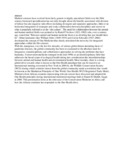| dc.description.abstract | Medical sciences have evolved from fairly generic to highly specialized fields over the 20th century.
Increased specialization has not only brought about the benefits associated with division of labour
but also negative side-effects including divergent and separatist approaches, little or no horizontal
integration of strategies and weak collaboration between disciplines and sectors in what is popularly
referred to as the ‘silo culture’. The need for collaboration between the animal and human medical
fields was pointed to by Rudolf Virchow (1821-1902) who, over a century ago, stated that “Between
animal and human medicine there is no dividing line-nor should there be”. Other luminaries like
William Osler (1849-1919) and Calvin Schwabe (1927-2006) developed the concept of One
Medicine that clearly articulated the necessity for integrated approaches within the life sciences.
With the emergence, over the last few decades, of serious global threats including those of pandemic
diseases, the global community has been re-awakened to the absolute need for integrative, transdisciplinary
and collaborative approaches in solving the problems that face humanity. Conservation
medicine emerged in the mid 1990s as an interdisciplinary field that addresses the broad scope of
ecological health taking into consideration the interrelationships between animal and human health
and environmental health. More recently, there is a strong global drive towards what is known as
the One Health paradigm that can be traced to an international meeting convened in New York in
2004 by the Wildlife Conservation Society (WCS) during which scientists drawn from the global
community made a resolution that would be known as the Manhattan Principles of One World, One
Health (WCS Registered Trade Mark). Ministers from African countries representing relevant sectors
have discussed and adapted the One Health principles during international ministerial meetings held
at Sharm El Sheikh, Egypt in 2008. This presentation looks at the relevance of the Conservation
Medicine in Africa and how the African continent has responded to the One Health drive. | en_US |

